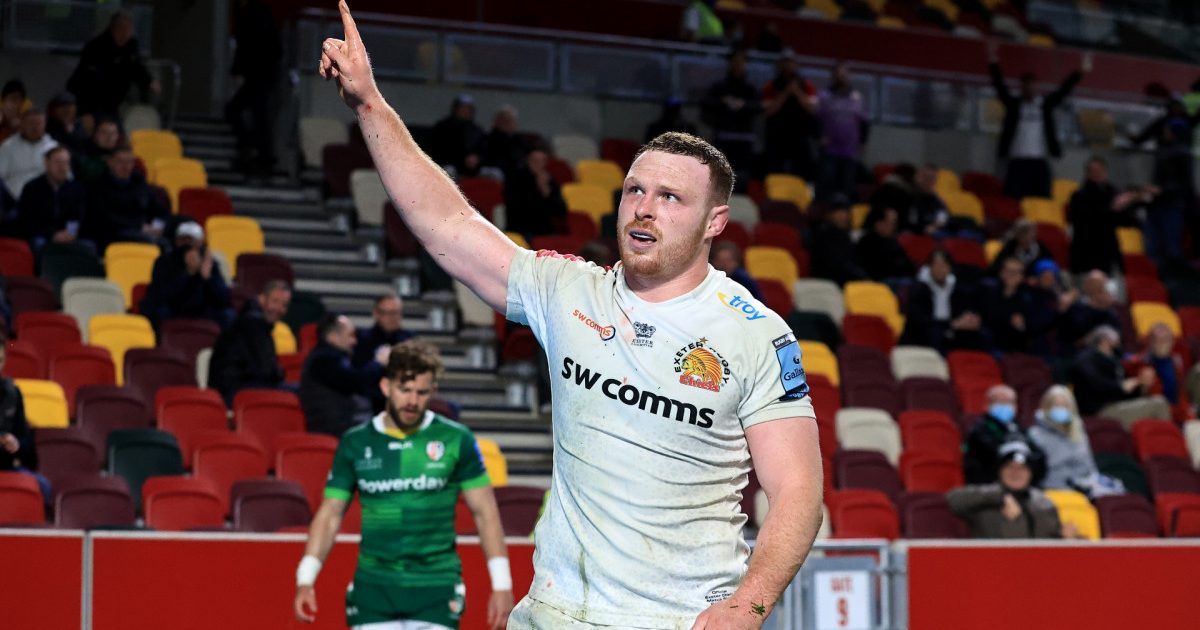'As good as the Lions was, guys, the best thing in your life this weekend is playing Newcastle'

Exeter boss Rob Baxter is hoping to quickly tune his quartet of 2021 Lions picks back into Gallagher Premiership mode following their presence at the midweek administration day in London where Sam Simmonds, Luke Cowan-Dickie, Jonny Hill and Stuart Hogg got to meet up with their fellow tourists to South Africa for the first time.
The defending champions are still in a heated battle to secure home advantage for next month’s Premiership semi-finals and they have three regular-season matches remaining, starting with Sunday’s Sandy Park visit by Newcastle. All eyes will again be on Simmonds, the Lions bolter who has lit up the English league season.
Ignored by Eddie Jones, who hasn’t chosen the back-rower for an England game since March 2018, Simmonds has been enjoying an incredible vein of form which culminated in his Lions selection by Gatland, a feat he celebrated with last week’s try hat-trick at London Irish.
That brought his Premiership tally this season to 19 tries, two more than the previous best-ever mark set by Richmond’s Dominic Chapman 23 years ago and Wasps’ Christian Wade in 2016/17. Simmonds was back at Exeter training on Thursday after linking up with the Lions and coach Baxter was expected him to quickly switch back into club mode.
“No, I haven’t spoken to him yet,” reported Baxter when he held his weekly media briefing on Thursday morning. “I have seen him about but I have been in meetings and media and bits and pieces since early morning, so I’ll catch up with him over the course of the day.
The 37 players chosen by Warren Gatland to tour South Africa have had their first meet-up in London ?#Lions2021 #Lions
https://t.co/DJFIM2PyFQ— RugbyPass (@RugbyPass) May 26, 2021
“They are level-headed guys, they will take it in their stride and they will get on. We have got our training day today and they will be back in the swing of things and ready to go on Sunday. I’m pretty comfortable with it all. I’m really pleased for them. They have got the opportunity of this experience. Being part of the Lions, it’s just an incredible thing to achieve as a rugby player but at the same time now my job is to just go right, as good as it [Lions administration day] was guys the best thing in your life this weekend is playing Newcastle in front of Exeter Chiefs supporters, so let’s get our feet on the ground and let’s get a good job done.”
In the immediate wake of his record-breaking Premiership scoring exploits in London last week, Simmonds was selflessly effusive in his praise of his teammates for their enthusiasm in creating try chances for him. Baxter described that sort of generous reaction from the No8 as in keeping with what he has experienced working with Simmonds and his out-half brother Joe.
“He [Sam] is a good guy first and foremost. He and his brother are local players, they came through the academy, they have done it the right way. It has not been easy for them, they have spent time on loan, they have spent time waiting behind senior players, they have worked exceptionally hard and they have taken opportunities when they have come along. They have done it all the right way and they are not silly.
“They know the systems and the way we play, they know their roles in helping other people at times and they probably don’t get the credit for some of the stuff that they do to help other players to help the team and so they are very aware of the players that help them.
“Sam knows we have some high expectations of what he can do on the ball so as much as he should and it is only right – it’s the proper thing to thank the other players for helping him score the tries – at the same time I can tell you right now the other players are very grateful for the things he contributes to get us near the line and then also get us over the line.
“It’s a two-way street and that is the way a good team should function, they appreciate each other’s roles, they appreciate each other’s strengths and weaknesses and they appreciate how important they are to each other because that is what you see with Sam, he just has an understanding of how important they all are to each other.
“It’s not so much that he is necessarily grateful but he really understands that they are all important to each other and they all make things work for each other and we have got a lot of players. Most good teams would say the same, they don’t really care who scores but they care about winning and for our team we care about Sam scoring tries.
“You could see it in the lads’ faces because they want someone to score records, they want someone to set high standards, they want someone to win something and to have those personal achievements as well and that kind of living through each other’s success, they have that in a big way. What you just see is a mutual respect and a mutual understanding of each other.”
Exeter have been talking Sam tactics in the wake of Simmonds' record-breaking Tuesday nighthttps://t.co/OMJuA5PMXS
— RugbyPass (@RugbyPass) May 19, 2021





























